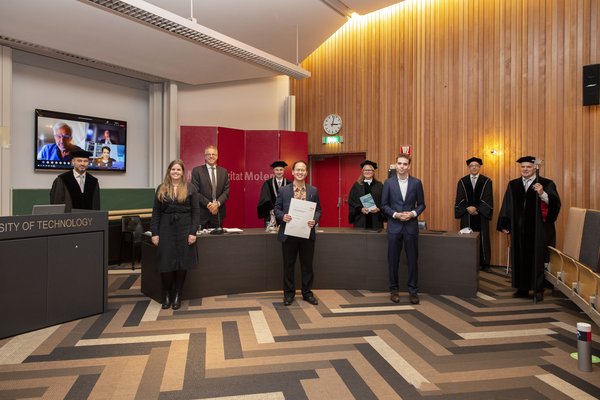MM/P PhD defense Yohanes Hugo

Last Friday, November 13, 2020, Yohanes Hugo successfully defended his PhD thesis entitled ‘Membrane development for large-scale hydrogen-bromine flow batteries’. Hugo combined his PhD study with a position as membrane-electrode scientist at Elestor BV, a company located in Arnhem and focused on the development and commercialization of the flow battery technology.
Hugo has conducted research on the development, characterization and application of membranes in large-scale HBr batteries for electricity storage. The transition to sustainable energy supply requires energy storage. The hydrogen bromine flow battery (HBFB) is a low cost flow battery for large scale energy storage with a high flexibility. A cation exchange membrane physically separates the liquid bromine electrolyte at the cathode from the gaseous hydrogen at the anode while allowing proton transport from anode to cathode and vice versa. The goal of this work was to study and improve the design and performance of this cation exchange membrane.
Performance mapping of commercially available membranes shows that distinct ionic channels in the membrane (as present in perfluorosulfonic acid (PFSA) membranes) highly favour ion conduction but too wide ionic channels result in high bromine species crossover, poisoning and degrading the catalyst particles and thus reducing the HBFB lifetime. In addition, membrane reinforcement mechanically limits membrane swelling thus also reducing bromine species crossover. High-frequency cycling load accelerated lifetime tests with PFSA, sulfonated polyvinylidene fluoride (SPVDF) and sulfonated polyethylene (SPE) membranes elucidated that the flow cell lifetime relates linearly to the membrane bromine species crossover rate due to gradual degradation-dissolution of the noble metal catalyst over time. For safe operation, low bromine concentrations are required. The research clarified that this can indeed be established with bromine complexing agents. However, this also decreases the PFSA conductivity due to strong interaction of the positively charged complexing agent with the negatively charged functional groups of the PFSA membrane. As a next step, novel PFSA/polyvinylidene fluoride (PVDF) electrospun composite membranes were developed. Subsequent hotpressing of the obtained polymer mats resulted in dense proton conducting membranes with with good flow battery performance. Finally, a detailed techno-economic analysis was performed for a large scale HBFB model system. To decrease capital investment, a reduction in tanks size and electrolyte volume would be beneficial. However, most crucial for economical implementation is a decrease in membrane and electrode resistance combined with an increase in their durability and lifetime.
For more information please contact Prof. dr. ir. Kitty Nijmeijer (d.c.nijmeijer@tue.nl) or Dr. ing. Zandrie Borneman (z.borneman@tue.nl).